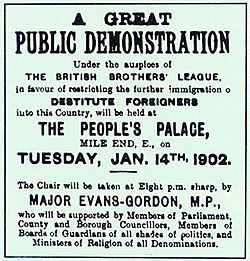Aliens Act 1905 facts for kids
The Aliens Act 1905 was a law passed in the United Kingdom in 1905. It was the first time the UK introduced rules for people coming into the country, known as immigration controls. This law also made it a requirement for new arrivals to register. The main goal was to decide who could enter and who should be turned away.

|
|
| Long title | An Act to amend the Law with regard to Aliens. |
|---|---|
| Citation | 5 Edw. 7. c. 13 |
| Dates | |
| Royal assent | 11 August 1905 |
| Other legislation | |
| Repeals/revokes | Registration of Aliens Act 1836 |
| Repealed by | Aliens Restriction (Amendment) Act 1919 |
|
Status: Repealed
|
|
| Text of statute as originally enacted | |
| Top - 0-9 A B C D E F G H I J K L M N O P Q R S T U V W X Y Z |
The Act gave the Home Secretary (a top government minister) control over immigration and nationality matters. People who seemed unable to support themselves or might need public assistance were called "undesirable." The law also allowed officials to refuse entry to people for health reasons.
People seeking asylum (safety) because they were fleeing religious or political unfair treatment were supposed to be exempt. However, their requests for safety were often ignored.
While the Act aimed to stop poor people or those who broke the law from entering, a key reason for it was to control Jewish immigration. Many Jewish people were arriving from Eastern Europe, especially after 1880. This increase in arrivals helped lead to the creation of the Aliens Act 1905.
The 1905 Act was later replaced by the Aliens Restriction Act 1914, which had much stricter rules. The Aliens Act 1905 was finally cancelled by the Aliens Restriction (Amendment) Act 1919. Some of the border control ideas from the 1905 Act continued to be used for many years.
Why the Act Was Created
Growing Calls for Immigration Rules

In the 1800s, about five million Jews lived in the Russian Empire. This was the largest Jewish community in the world at that time. They faced unfair treatment because of their religion. They were forced to live in a specific area called the Pale of Settlement, near the Polish-Russian borders. Life there was very difficult, and many lived in great poverty.
About half of these Jewish people left the Russian Empire. Most went to the United States, but around 150,000 came to the United Kingdom. Many settled in the East End of London. This movement of people was highest in the late 1890s. Tens of thousands of Jewish people, often poor and with few skills, settled in this area.
Public Opinion and Concerns
By the early 1900s, some people and newspapers started to react negatively to the immigration. A group called the British Brothers' League was formed. Important politicians, like William Evans-Gordon, supported this group. They organized marches and collected signatures for petitions.
At their meetings, speakers said that Britain should not become a "dumping ground for the scum of Europe." In 1905, a newspaper called the Manchester Evening Chronicle wrote that "the dirty, destitute, diseased... foreigner who dumps himself on our soil... shall be forbidden to land." Sadly, unfair treatment against Jewish people, known as Antisemitism, led to violence in South Wales in 1902 and 1903.
The Act was also influenced by economic and social problems in the East End of London. Many immigrants settled there, and it was hard to find work. Families often needed everyone to contribute to earn money.
Winston Churchill's Opposition
Winston Churchill, who later became a famous Prime Minister, spoke out against the Aliens Act. He believed the law would encourage unfair feelings against foreigners and Jewish people. He also thought it would create problems for workers by limiting competition.
Churchill supported Britain's long tradition of allowing free entry and offering safety to people. He felt that this approach had greatly benefited the country. On May 31, 1904, he even changed political parties, moving from the Conservatives to the Liberal Party, partly because of his views on this issue.
 | James B. Knighten |
 | Azellia White |
 | Willa Brown |

